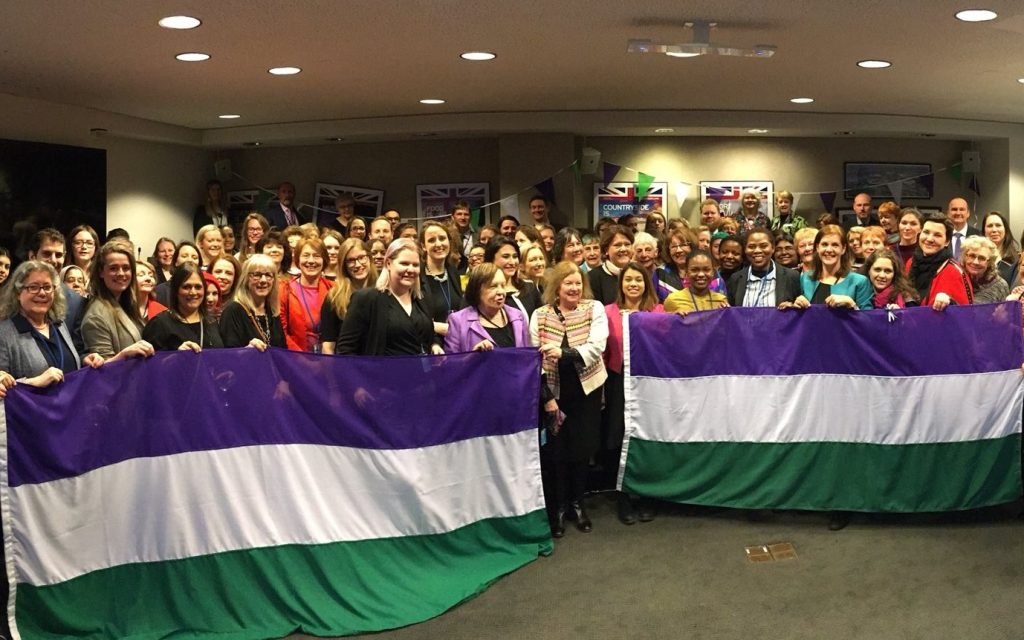 Subscribers Only
People
Subscribers Only
People 
Women from Wales call for a global UN Treaty to combat violence against women and girls (VAWG) at the UN annual conference of its Commission on the Status of Women, Jean Silvan Evans from Wales Assembly of Women tells us more.
More than 4,000 women from Wales and the world gathered in New York for the United Nations annual conference of its Commission on the Status of Women (UN-CSW), the principal global body exclusively dedicated to the empowerment of women, where a strong theme to emerge was the need for a legally binding UN Treaty to combat violence against women and girls (VAWG).
Wales Assembly of Women
The delegation from Wales Assembly of Women, an independent campaigning NGO, was led by Professor Jackie Jones (chair), an internationally recognised expert in gender equality law, who used the two panel meetings granted to Wales Assembly of Women to press the point that existing UN treaties do not refer directly to violence against women.
Deeply involved in international pressure to push for a UN Treaty, she recalled a previous UN-CSW had called VAWG ‘one of the most prevalent abuses of human rights in the world’ and stressed the absence of legally binding provisions in a UN treaty made it hard to hold countries to account for their response to domestic violence, forced marriage and other abuses.
UN annual conference of its Commission on the Status of Women
The Wales Assembly of Women group met up with fellow Welsh women from the two UK Parliamentary delegations: Baroness Anita Gale, Shadow Spokesperson for Equalities and Women’s Issues in the House of Lords; and Tonia Antoniazzi, MP for Gower and a member the House of Commons Women and Equalities Committee.
Baroness Gale chaired the first Wales Assembly of Women panel, when four young women university researchers talked about the difficulties of overcoming engrained culture. People could be educated, laws could be passed but persistent culture still allowed sex selective abortion, honour killing, human trafficking and FGM to continue, including in the UK among its ethnically-diverse communities.
Baroness Gale said it was good to see a contingent from Wales at UN-CSW. She said: ‘It is such a great experience to be here with thousands of women from across the world meeting together to work out how we can improve the lives of women and girls.’ It made me proud to be part of the Wales Assembly of Women delegation, which also included Dr Eleri Evans (vice-chair) and the young university researchers.
The second session was chaired by, Rashida Manjoo, the former UN Special Rapporteur on Violence Against Women, who has spoken out against the problems she faced in holding states to account. Reporting on the UK in 2014, she commented there was a ‘boys club sexist culture’ and said sexism was worse in the UK than in other places. She feared sexual bullying and harassment in schools was “routine”.
Violence Against Women and Girls
International statistics are alarming. Figures given by the Spotlight Initiative, a joint UN-EU venture working to eliminate all forms of violence against women and girls, estimated 35% of women had experienced physical or sexual violence, either by their partner or a stranger. Across the globe one in two women killed in 2012 were killed by their partner or a family member; and one in five women and girls had experienced physical and/or sexual violence by an intimate partner in the last 12 months.
Dr Eleri Evans said that although Wales had reason to be proud of its record in VAWG – first Minister Carwyn Jones had called for Wales to be ‘the safest place in Europe for women’ and the 2015 Violence against Women, Domestic Abuse and Sexual Violence (Wales) Act was the first legislation of its kind in the UK – the figures showed one in three women in Wales experienced violence and abuse at some point.
Global UN Treaty against VAWG
Professor Jones said that, tired of waiting, in the absence of a global, legally binding treaty at UN level, some regions had taken matters into their own hands. The Council of Europe had adopted a Convention on Preventing and Combating Violence against Women and Domestic Violence, known as the Istanbul Convention, in 2011.
The Convention, which covers forced marriage, stalking, psychological violence and forced abortion, was signed by the UK in 2012 but has not yet been ratified. Baroness Gale called its ratification in the House of Lords a few days after returning from UN-CSW in the debate on the proposed new Bill on Domestic Violence.
She said: ‘I look forward to the ratification of the Istanbul Convention to deal with the root causes of inequality and discrimination that underpin domestic abuse.’ Much had been achieved in raising awareness of domestic abuse and violence against women and girls. But more needed to be done. ‘I hope the new Bill,’ she said, ‘will go some way towards improving the lives of women and children.’
Jean Silvan Evans is from Wales Assembly of Women.


